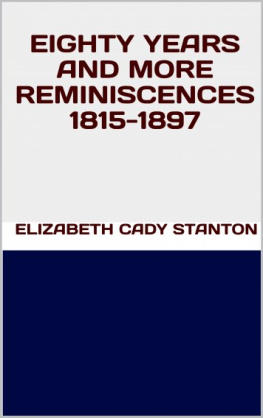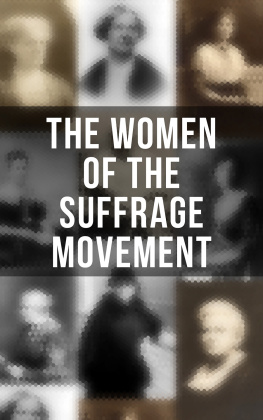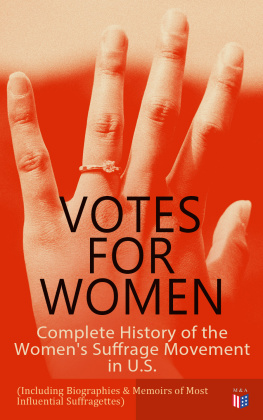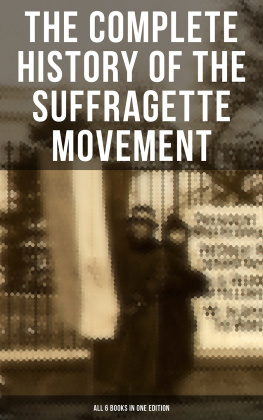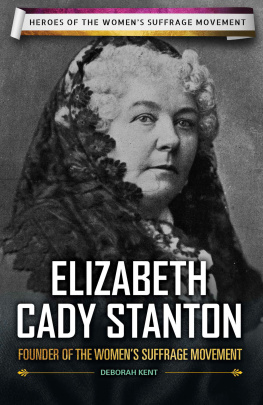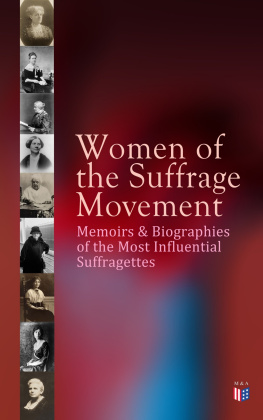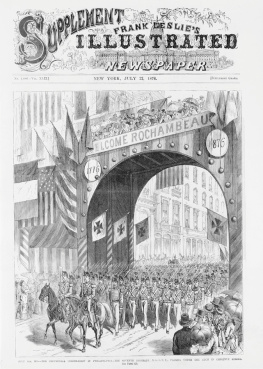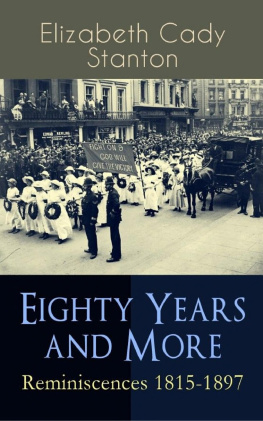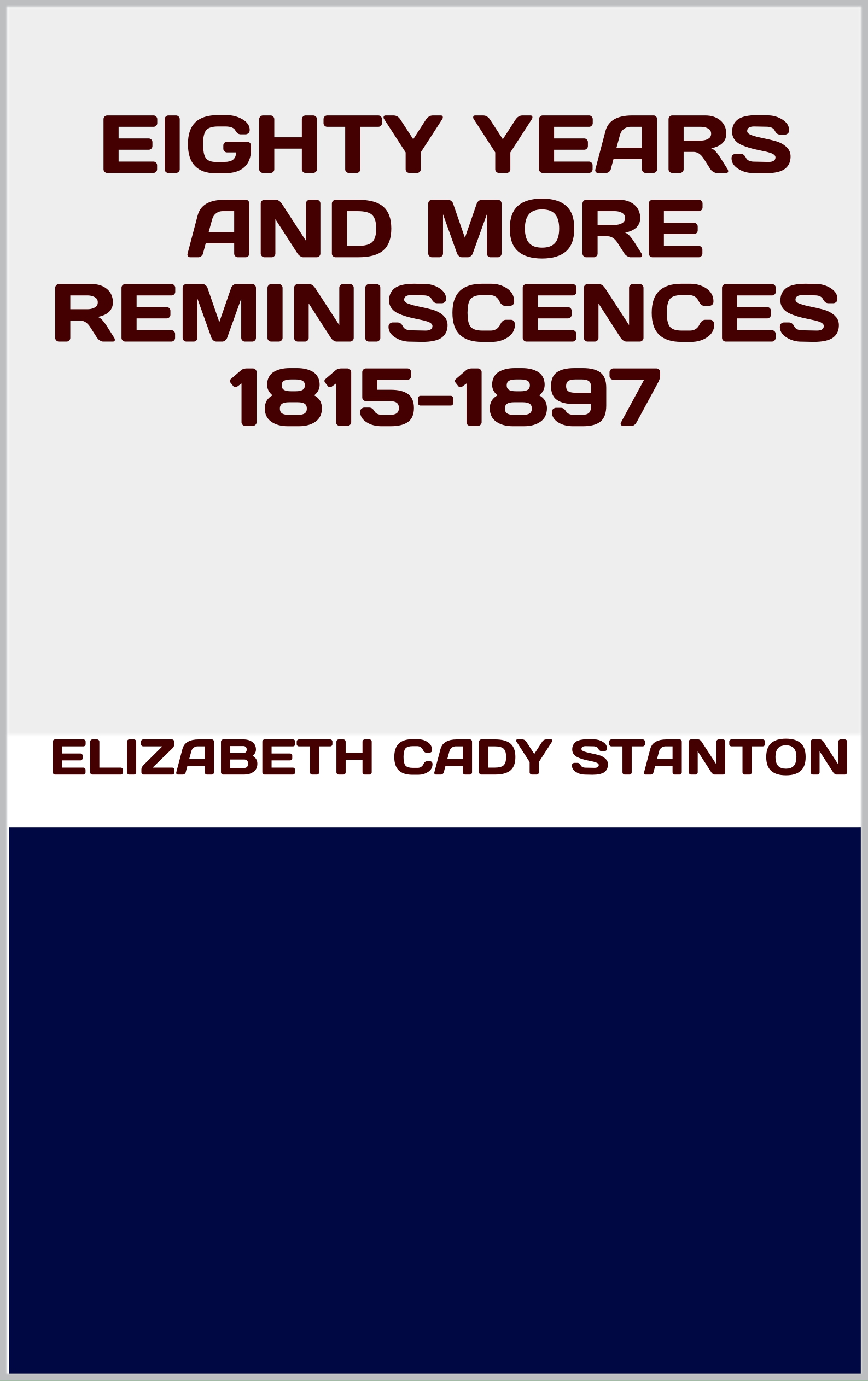CHAPTER I. CHILDHOOD
The psychical growth of a child isnot influenced by days and years, but by the impressions passingevents make on its mind. What may prove a sudden awakening to one,giving an impulse in a certain direction that may last for years,may make no impression on another. People wonder why the childrenof the same family differ so widely, though they have had the samedomestic discipline, the same school and church teaching, and havegrown up under the same influences and with the same environments.As well wonder why lilies and lilacs in the same latitude are notall alike in color and equally fragrant. Children differ as widelyas these in the primal elements of their physical and psychicallife.
Who can estimate the power ofantenatal influences, or the childs surroundings in itsearliest years, the effect of some passing word or sight on one,that makes no impression on another? The unhappiness of one childunder a certain home discipline is not inconsistent with thecontent of another under this same discipline. One, yearning forbroader freedom, is in a chronic condition of rebellion; the other,more easily satisfied, quietly accepts the situation. Everything isseen from a different standpoint; everything takes its color fromthe mind of the beholder.
I am moved to recall what I can ofmy early days, what I thought and felt, that grown people may havea better understanding of children and do more for their happinessand development. I see so much tyranny exercised over children,even by well-disposed parents, and in so many varied forms,--atyranny to which these parents are themselves insensible,--that Idesire to paint my joys and sorrows in as vivid colors as possible,in the hope that I may do something to defend the weak from thestrong. People never dream of all that is going on in the littleheads of the young, for few adults are given to introspection, andthose who are incapable of recalling their own feelings underrestraint and disappointment can have no appreciation of thesufferings of children who can neither describe nor analyze whatthey feel. In defending themselves against injustice they are ashelpless as dumb animals. What is insignificant to their elders isoften to them a source of great joy or sorrow.
With several generations ofvigorous, enterprising ancestors behind me, I commenced thestruggle of life under favorable circumstances on the 12th day ofNovember, 1815, the same year that my father, Daniel Cady, adistinguished lawyer and judge in the State of New York, waselected to Congress. Perhaps the excitement of a politicalcampaign, in which my mother took the deepest interest, may havehad an influence on my prenatal life and given me the strong desirethat I have always felt to participate in the rights and duties ofgovernment.
My father was a man of firmcharacter and unimpeachable integrity, and yet sensitive and modestto a painful degree. There were but two places in which he felt atease--in the courthouse and at his own fireside. Though gentle andtender, he had such a dignified repose and reserve of manner that,as children, we regarded him with fear rather than affection.
My mother, Margaret Livingston, atall, queenly looking woman, was courageous, self-reliant, and ather ease under all circumstances and in all places. She was thedaughter of Colonel James Livingston, who took an active part inthe War of the Revolution.
Colonel Livingston was stationed atWest Point when Arnold made the attempt to betray that strongholdinto the hands of the enemy. In the absence of General Washingtonand his superior officer, he took the responsibility of firing intothe Vulture, a suspicious looking British vessel that lay at anchornear the opposite bank of the Hudson River. It was a fatal shot forAndr, the British spy, with whom Arnold was then consummatinghis treason. Hit between wind and water, the vessel spread hersails and hastened down the river, leaving Andr, with hispapers, to be captured while Arnold made his escape through thelines, before his treason was suspected.
On General Washingtonsreturn to West Point, he sent for my grandfather and reprimandedhim for acting in so important a matter without orders, therebymaking himself liable to court-martial; but, after fully impressingthe young officer with the danger of such self-sufficiency onordinary occasions, he admitted that a most fortunate shot had beensent into the Vulture, for, he said, we are inno condition just now to defend ourselves against the Britishforces in New York, and the capture of this spy has savedus.
My mother had the military idea ofgovernment, but her children, like their grandfather, were disposedto assume the responsibility of their own actions; thus, theancestral traits in mother and children modified, in a measure, thedangerous tendencies in each.
Our parents were as kind,indulgent, and considerate as the Puritan ideas of those dayspermitted, but fear, rather than love, of God and parents alike,predominated. Add to this our timidity in our intercourse withservants and teachers, our dread of the ever-present devil, and thereader will see that, under such conditions, nothing but strongself-will and a good share of hope and mirthfulness could havesaved an ordinary child from becoming a mere nullity.
The first event engraved on mymemory was the birth of a sister when I was four years old. It wasa cold morning in January when the brawny Scotch nurse carried meto see the little stranger, whose advent was a matter of intenseinterest to me for many weeks after. The large, pleasant room withthe white curtains and bright wood fire on the hearth, wherepanada, catnip, and all kinds of little messes which we wereallowed to taste were kept warm, was the center of attraction forthe older children. I heard so many friends remark, What apity it is shes a girl! that I felt a kind ofcompassion for the little baby. True, our family consisted of fivegirls and only one boy, but I did not understand at that time thatgirls were considered an inferior order of beings.
To form some idea of mysurroundings at this time, imagine a two-story white frame housewith a hall through the middle, rooms on either side, and a largeback building with grounds on the side and rear, which joined thegarden of our good Presbyterian minister, the Rev. Simon Hosack, ofwhom I shall have more to say in another chapter. Our favoriteresorts in the house were the garret and cellar. In the former werebarrels of hickory nuts, and, on a long shelf, large cakes of maplesugar and all kinds of dried herbs and sweet flag; spinning wheels,a number of small white cotton bags filled with bundles, marked inink, silk, cotton,flannel, calico, etc., as well asancient masculine and feminine costumes. Here we would crack thenuts, nibble the sharp edges of the maple sugar, chew some favoriteherb, play ball with the bags, whirl the old spinning wheels, dressup in our ancestors clothes, and take a birds-eyeview of the surrounding country from an enticing scuttle hole. Thiswas forbidden ground; but, nevertheless, we often went there on thesly, which only made the little escapades more enjoyable.
The cellar of our house was filled,in winter, with barrels of apples, vegetables, salt meats, cider,butter, pounding barrels, washtubs, etc., offering admirable nooksfor playing hide and seek. Two tallow candles threw a faint lightover the scene on certain occasions. This cellar was on a levelwith a large kitchen where we played blind mans buff andother games when the days work was done. These two rooms arethe center of many of the merriest memories of my childhooddays.

